- Cucurbit powdery mildew season is here. For a review of CPM control strategies please click here.
- Cucurbit downy mildew has been reported as far north as southern Georgia on cucumber and cantaloupe and in South Carolina on cucumber. For a review of CDM control please click here. To track the progress of CDM please visit the CDM forecasting website.
- No reports of Late blight in region. To track the progress of Late blight in the US please click here.
- Basil downy mildew has been reported central TN from basil started in the greenhouse and in the field in southern FL to date. None has been reported in the region. To follow the progress of BDM in the US please click here.
- Angular leaf spot has been reported in summer squash. Look for angular lesions delimited by leaf veins and ‘shotholes’ in infected leaves that develop after periods of hot, dry weather.
- Phytopthora blight has been reported in squash.
- Rhizoctonia and Pythium root rot have been reported in pepper. For a review of identifying and controlling root rots please click here.
- Septoria leaf spot and bacterial blight have been reported in parsley.
- Bacterial canker and speck have been reported in fresh-market tomato.
- Timber rot, or white mold, has been reported in tomato.
- White rust and Cercospora have been reported in spinach.
- Bacterial leaf spot has been reported in sweet basil. BLS of sweet basil is a relatively new disease of basil in the US. The bacterium has a large host range and can survive and overwinter in the soil on infested plant debris. Disease development is favored by hot, humid, rainy weather. Periods of hot, dry weather will help mitigate disease development.
- Sand blasting has been reported on a number of leafy green and other crops these past few weeks. Injury from sand blasting predisposes plants to bacterial infections. Remember, all bacteria need a wound or a natural opening, such as a stomata, to gain entry into the plant. Fields with extensive injury need to be scouted regularly, and most likely will need to be sprayed regularly with a copper fungicide or disinfectant-type product to help mitigate infection and spread.
- For a review on how to avoid sunscald injury on transplanted crops please click here.
- With the on and off again heavy rains we have been getting, along with warmer weather, all growers should consider applying at-transplanting fungicides for root rot control. Please click here to see these articles.
- The 2020/2021 Commercial Vegetable Production Recommendations Guide is available for free online! With many county offices running reduced hours or being closed this is the easiest way to obtain the newest recommendations.
- For a quick review on managing fungicide resistance development using tank mixes and fungicide rotations, and information on FRAC group 4, FRAC group 7, and FRAC group 3 and FRAC group 11 fungicides please click on hyperlinks.
Vegetable Crops Edition
Seasonal updates and alerts on insects, diseases, and weeds impacting vegetable crops. New Jersey Commercial Vegetable Production Recommendations updates between annual publication issues are included.
Subscriptions are available via EMAIL and RSS.
Quick Links:
 NJ Commercial Vegetable Production Recommendations
NJ Commercial Vegetable Production Recommendations
 Rutgers Weather Forecasting - Meteorological Information important to commercial agriculture.
Rutgers Weather Forecasting - Meteorological Information important to commercial agriculture.
Vegetable Disease Update – 6/12/20
Webinar Scheduled for Ag Employers – Understanding & Implementing NJ’s COVID-19 Guidance For Migrant & Seasonal Farmworkers, Employers & Housing Providers
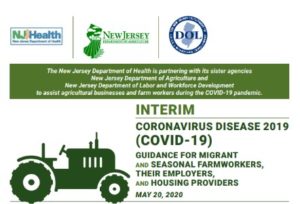
This event requires registration and there will be a follow-up survey.
- Rick VanVranken & Wes Kline, Agricultural Agents, Rutgers Cooperative Extension
- Secretary of Agriculture Doug Fisher, NJ Dept. of Agriculture
- Asst. Secretary of Agriculture Monique Purcell, NJDA
- Amanda Medina-Forrester, MA, MPH, Executive Director, Office of Minority & Multicultural Health, NJ Dept. of Health
- Christine Blumauer, Policy Advisor, Office of the Commissioner, NJ Dept. of Labor & Workforce Development
- Pete Furey, Exec. Director & Ben Cassella, Field Representative, NJ Farm Bureau
The NJDOH partnered with the NJDA and the NJDOL to create this guidance for agricultural employers focusing on precautions to help protect farm employees from COVID-19 on New Jersey farms and in farm labor housing. This webinar will review these guidelines. Questions from participants will be taken and addressed during the webinar.
IPM Update 6/10/20
Sweet Corn
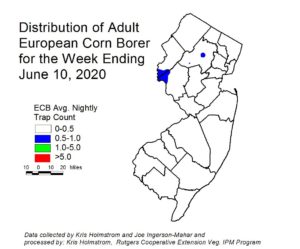 European corn borer (ECB) moth catches have declined over the past week despite increasing temperatures. At this time, activity is highest near the Hunterdon/Warren County border, although this is still a low level population (see ECB map at left). The number of traps registering moderate catches remains low, and catches are widely dispersed. Another week of trapping will clarify whether this decrease in activity signifies the end of the first flight. A number of corn plantings are now in whorl through tassel stages and able to support ECB larvae. Larval infestations as high as 12% were detected as far north as Hunterdon County this week. As moth catches fall, larval development and damage increase. We expect that with a few more warm days, these infestation rates will climb quickly in many parts of the state.
European corn borer (ECB) moth catches have declined over the past week despite increasing temperatures. At this time, activity is highest near the Hunterdon/Warren County border, although this is still a low level population (see ECB map at left). The number of traps registering moderate catches remains low, and catches are widely dispersed. Another week of trapping will clarify whether this decrease in activity signifies the end of the first flight. A number of corn plantings are now in whorl through tassel stages and able to support ECB larvae. Larval infestations as high as 12% were detected as far north as Hunterdon County this week. As moth catches fall, larval development and damage increase. We expect that with a few more warm days, these infestation rates will climb quickly in many parts of the state.
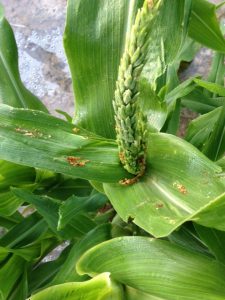 Look for the characteristic “shot-hole” type of feeding (photo below at right) and consider treating when infested plants exceed 12% in a 50 plant sample. As plantings proceed to the pre-tassel stage, ECB larvae may be found in emerging tassels (see photo at left). It is a good idea to treat individual plantings as they move into the full tassel/first silk stage one time. This eliminates any ECB larvae that have emerged with the tassels as they begin to move down the stalk to re-enter near developing ears.
Look for the characteristic “shot-hole” type of feeding (photo below at right) and consider treating when infested plants exceed 12% in a 50 plant sample. As plantings proceed to the pre-tassel stage, ECB larvae may be found in emerging tassels (see photo at left). It is a good idea to treat individual plantings as they move into the full tassel/first silk stage one time. This eliminates any ECB larvae that have emerged with the tassels as they begin to move down the stalk to re-enter near developing ears.
Useful insecticides for this particular application include synthetic 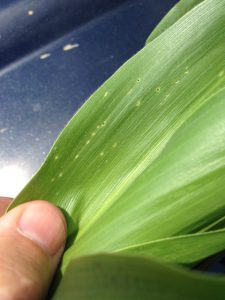 pyrethroids (IRAC Grp 3), spinosyns (including OMRI approved Entrust) IRAC Grp 5), and diamides such as Coragen (IRAC Grp 28) or materials such as Besiege which include the active ingredient in Coragen. Synthetic pyrethroids alone should NOT be used for corn earworm (CEW) protection on silking corn. Control with these materials is very inconsistent.
pyrethroids (IRAC Grp 3), spinosyns (including OMRI approved Entrust) IRAC Grp 5), and diamides such as Coragen (IRAC Grp 28) or materials such as Besiege which include the active ingredient in Coragen. Synthetic pyrethroids alone should NOT be used for corn earworm (CEW) protection on silking corn. Control with these materials is very inconsistent.
The highest nightly trap catches of ECB for the week ending 6/10/20 are as follows:
| Allamuchy 1 | Crosswicks 1 | Milford 1 |
| Blairstown 1 | Denville 1 | Milltown 1 |
| Califon 1 | Downer 1 | Springdale 1 |
| Chester 1 | Eldora 1 | Tabernacle 1 |
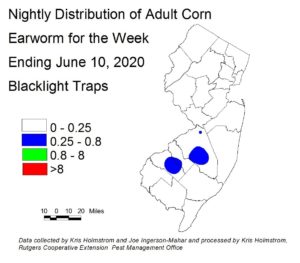 Widely scattered, but slightly increased catches of corn earworm (CEW) occurred this past week. As the earliest plantings (mainly in the south) proceed to full tassel and on to silk, even this low population can present a limited threat.
Widely scattered, but slightly increased catches of corn earworm (CEW) occurred this past week. As the earliest plantings (mainly in the south) proceed to full tassel and on to silk, even this low population can present a limited threat.
The highest nightly trap catches of CEW in black light traps for the week ending 6/10/20 are as follows:
| Califon 1 | Downer 1 | Green Creek 1 |
| Dayton 1 | Georgetown 1 | Tabernacle 1 |
Important Update on Registration of Low-Volatility Dicamba Herbicides
On June 3, 2020, the U.S. Court of Appeals for the Ninth Circuit issued a ruling that vacates current U.S. registrations of of three dicamba herbicides, XtendiMax (Bayer), Engenia (BASF) and FeXapan (Corteva). The Court ruled in favor of a petition challenging the EPA’s 2018 registration decision. The ruling comes after a group of environmental organizations filed a petition with the Court challenging the U.S. Environmental Protection Agency’s . Other dicamba-containing products are not concerned by this ruling.
The subsequent action by the EPA provides, among other things, that “growers and commercial applicators may use existing stocks that were in their possession on June 3, 2020, the effective date of the Court decision. Such use must be consistent with the product’s previously-approved label, and may not continue after July 31, 2020.”
Click here for the EPA’s full order – see page 11 for key details.
The EPA’s order addresses the use, sale, and distribution of existing stocks of low-volatility dicamba products impacted by the Court’s ruling.
On-Farm Readiness Reviews to Resume
The Food and Drug Administration (FDA) has lifted the restrictions on carrying out On-Farm Readiness Reviews (OFRR). The New Jersey Department of Agriculture (NJDA) in cooperation with Rutgers Cooperative Extension will start offering OFRR’s in the next couple of weeks.
The objectives of the On-Farm Readiness Review program are to:
- Offer a voluntary, non-regulatory, pre-inspectional “readiness” review primarily for covered farms and discuss whether the farm is covered by Food Safety Modernization Act (FSMA) Produce Safety Rule or whether the farm may be exempt from parts of FSMA
- Promote coordination between farmers, regulators & educators
- Educate regulators about on-farm practices and conditions
- Familiarize non-qualified farms with the regulations
This is a confidential review of individual farm operations. Usually there are two individuals on the team, one each from NJDA and Extension. This is not a records review, but an overall assessment of the farm operation and how the farming practices conform to the Produce Safety Rule. The team walks around the operation with the grower and discusses the different aspects of the farm. Once the review is over the group sits together and reviews the findings and makes suggestions for possible changes to meet the rule. Any notes that are taken during the review are left with the grower.
Any fruit or vegetable operation with sales over $25,000 are eligible for the review. It is encouraged that someone on the farm has gone through the Produce Safety Alliance (PSA) training prior to the review. The PSA training meets the requirement for training under the Product Safety Rule that someone on the operation must receive training recognized by FDA.
The OFRR is a good way to help a grower understand what is required under the Rule. How do you schedule for a review? Contact Chris Kleinguenther, NJDA, at Christian.Kleinguenther@ag.nj.gov. Chris will contact the grower and schedule a date and time for the review.
Food Safety Modernization Act (FSMA) Produce Safety Rule Inspections to Resume
The Food and Drug Administration has announced that FSMA inspections can resume when the state is ready. The New Jersey Department of Agriculture (NJDA) will be starting inspections of fruit and vegetable operations in the next couple of weeks. NJDA will contact individual growers to schedule the inspection. These will be educational inspections covering operations with sales of $250,000 and above. If the farm thinks they are qualified exempt they will need to show some type of financial records for the last three years proving they meet the qualified exemption standard.
To be eligible for a qualified exemption, the farm must meet two requirements:
- The farm must have food sales averaging less than $500,000 per year adjusted for inflation during the previous three years.
- The farm’s direct sales to qualified end-users must exceed sales to all other buyers combined during the previous three years. A qualified end-user is either (a) the consumer of the food or (b) a restaurant or retail food establishment that is located in the same state or not more than 275 miles away.
If the operation is qualified exempt the requirement other than the financial records is to label either individual containers or have a roadside stand/farmers market sign prominently and conspicuously displayed that has the name and complete business address of the farm where the produce was grown.
For additional information contact Chris Kleinguenther, at Christian.Kleinguenther@ag.nj.gov
